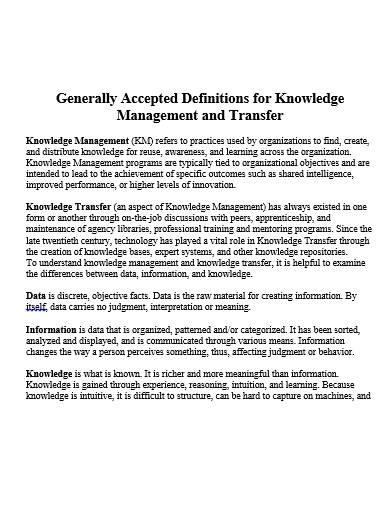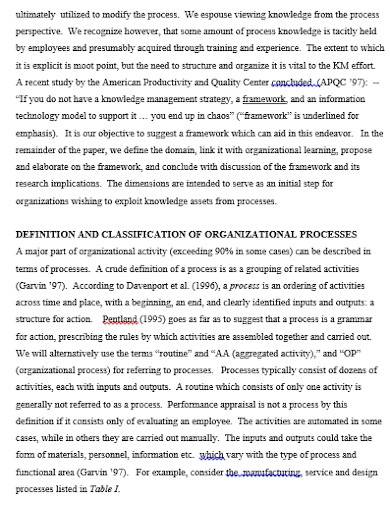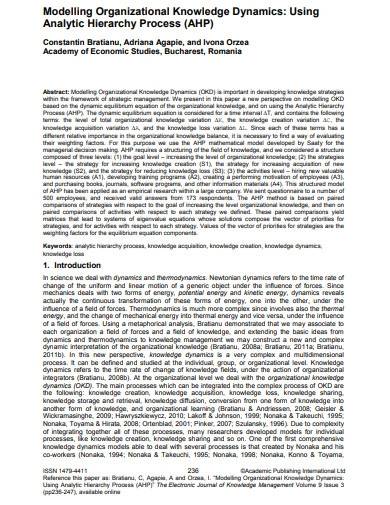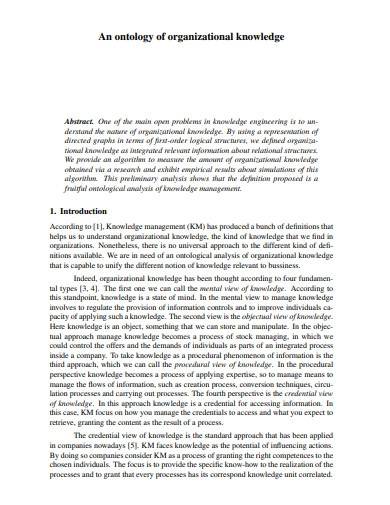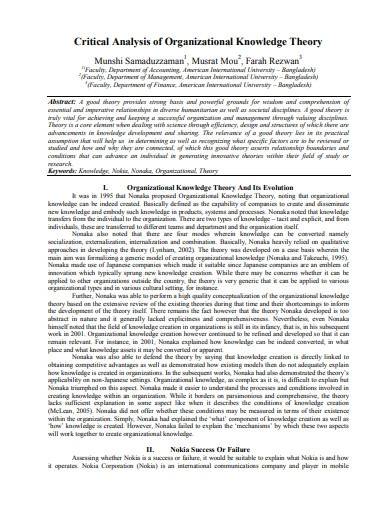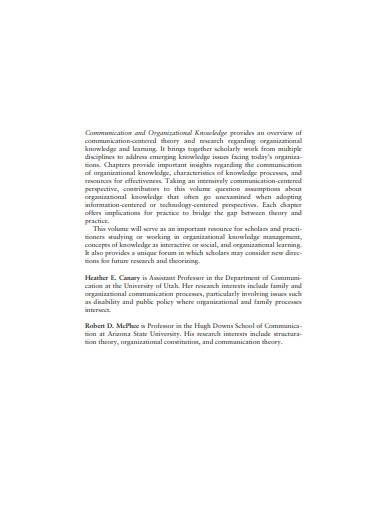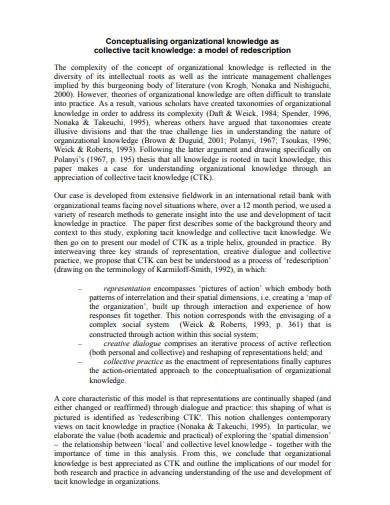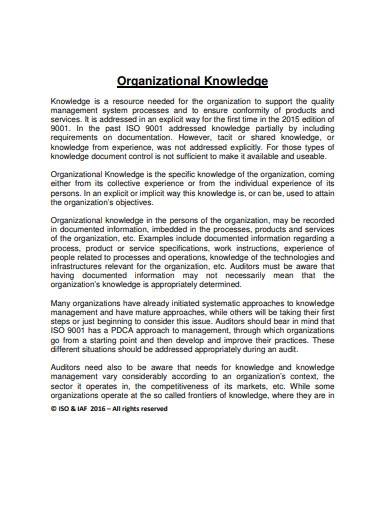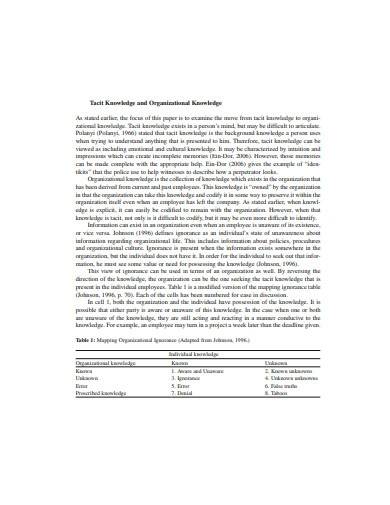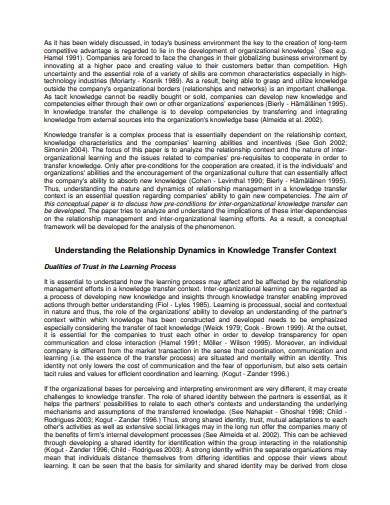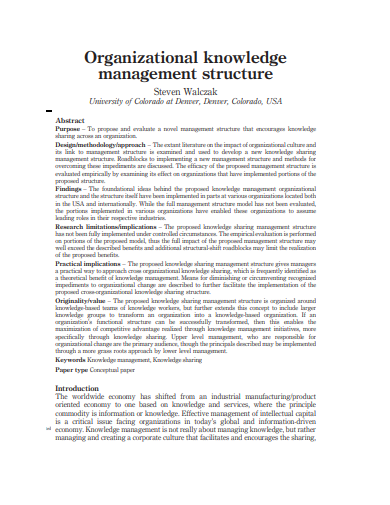Knowledge management is one of the most important aspects of running a business or organization as it helps in improving their decision-making process and speeding up their learning, innovation, efficiency, and agility. A company’s knowledge base is established from the input of its team members or employees which eventually becomes the organization’s foundation for achieving its business goals, management plans, and strategic action plans.
FREE 10+ Organizational Knowledge Samples & Templates in MS Word | PDF
1. Organizational Knowledge Template
2. Sample Organizational Process Knowledge
3. Sample Organizational Knowledge
4. Sample Organizational Knowledge Template
5. Analysis of Organizational Knowledge
6. Sample Communication Organizational Knowledge
7. Basic Organizational Knowledge Template
8. Formal Organizational Knowledge Template
9. Simple Organizational Knowledge Template
10. Standard Organizational Knowledge
11. Organizational Knowledge Management Structure
What is Organizational Knowledge?
Organizational knowledge refers to the knowledge built from the gathered information or individual experiences of every employee within an organization. This collection of knowledge resources is shared, utilizes, absorbed, and applied to maintain the management and operational functions of the company or organization. Organizational knowledge includes product knowledge, intellectual property, employee handbooks, training manuals, customer communications, and lessons of failures and successes. This type of knowledge can be captured through archiving which can be a part of knowledge management efforts.
How to Create Organizational Knowledge
Organizational knowledge is a method utilized by organizations or companies to safeguard their knowledge and prevent its loss because of employee turnover or failure to share and capture essential information. Knowledge is an asset that is considered by businesses as one of their significant resources and therefore is an area that must be given special attention. Organizational knowledge provides an opportunity for companies to increase their awareness of knowledge requirements while ensuring efficient delivery of quality results and sustainable business.
Step 1: Determine and Prioritize Key Processes
Regardless of the task, create a list of its key processes and organize them according to their priority level or importance. You can work your way through the bottom to build knowledge needs on each process and focus on the most important process.
Step 2: Create a List of Stakeholders
Create a list of all the stakeholders who are involved in every process and make sure to provide each of their roles and responsibilities that require the knowledge and those that can provide the knowledge. Then, define what is the exact task your team member is doing when they are performing the process, the steps from start to finish, and who the involved stakeholders are.
Step 3: Define the Process Steps and Match them With the Appropriate Knowledge
Define your process steps and determine the needed knowledge to advance from every step in the most favorable way. This includes identifying the format to use to ensure it is readable and effective as well as the best possible way to deliver the knowledge.
Step 4: Perform Tests and Validate
Before concluding the process, make sure to validate your assumptions first. Do this by creating a trial batch of knowledge which can be made using the format you’ve defined in the previous steps and collect feedback from the main users.
FAQs
What are the categories of organizational knowledge?
Organizational knowledge is categorized into major types such as explicit knowledge which can be easily organized, articulated, and documented, implicit knowledge which is obtained from the application of explicit knowledge to a certain situation, and tacit knowledge which is gained through years of experience in a particular field or job.
What are the different sources of knowledge?
Knowledge can be obtained anywhere within an organization and comes in various forms such as individual, group or community, structural, and organizational memory.
What are the advantages of implementing organizational knowledge?
With organizational knowledge, businesses can improve their efficiency by allowing quick access to information, increasing collaboration within the organization, enhancing innovation, improving customer service, and reducing the costs associated with training and development plans.
Organizational knowledge refers to the process of enhancing individual knowledge and providing it clearly so it can be used as a knowledge network for the entire company or organization. It aims to turn inexpressible individual knowledge into more structured content that can be used to the advantage of the organization. Organizational knowledge can be a part of an organization’s strategic planning to achieve its business goals.
Related Posts
Sample Orientation Feedback Form
FREE 7+ Sample IT Manager Job Description Templates in PDF
FREE 13+ Sample Accounting Clerk Job Description Templates in ...
FREE 9+ Annual Implementation Plan Templates in PDF
Sample Skills Inventory Template
FREE 8+ Sample Medical Sales Resume Templates in MS Word PDF
FREE 6+ Self Performance Evaluation Samples in PDF
FREE 6+ Asset Management Agreement Samples in PDF
FREE 14+ Project Management Checklist Samples in PDF DOC
FREE 11+ Sample Finance Resume Templates in MS Word PDF
Sample Job Evaluation
FREE 9+ Sample Companion Planting Chart Templates in PDF MS ...
FREE 10+ Witness Information Form Samples in PDF MS Word
FREE 11+ Change Management Samples in DOC PDF
FREE 9+ ABC Chart Templates in PDF MS Word

